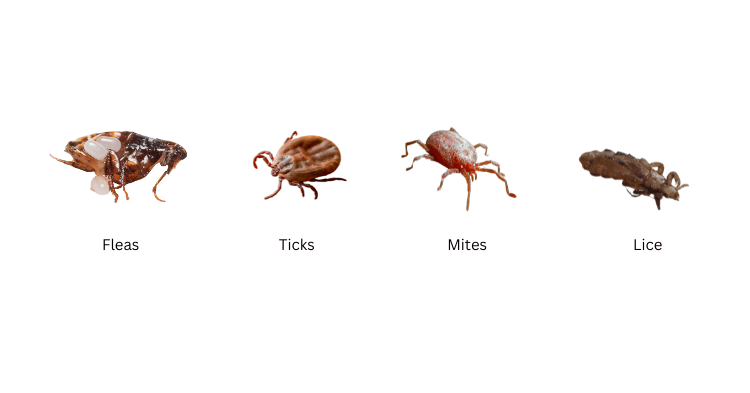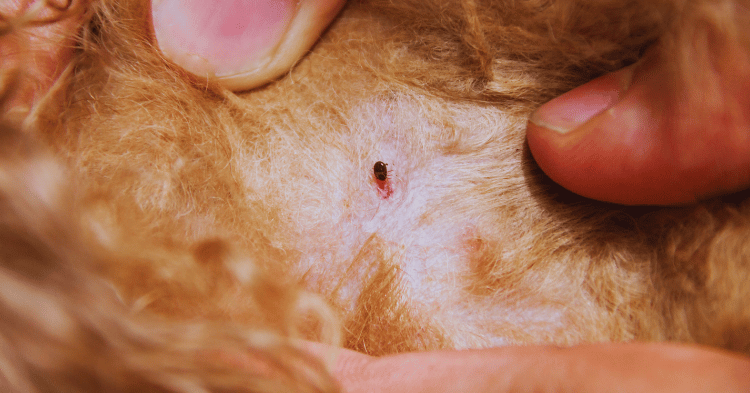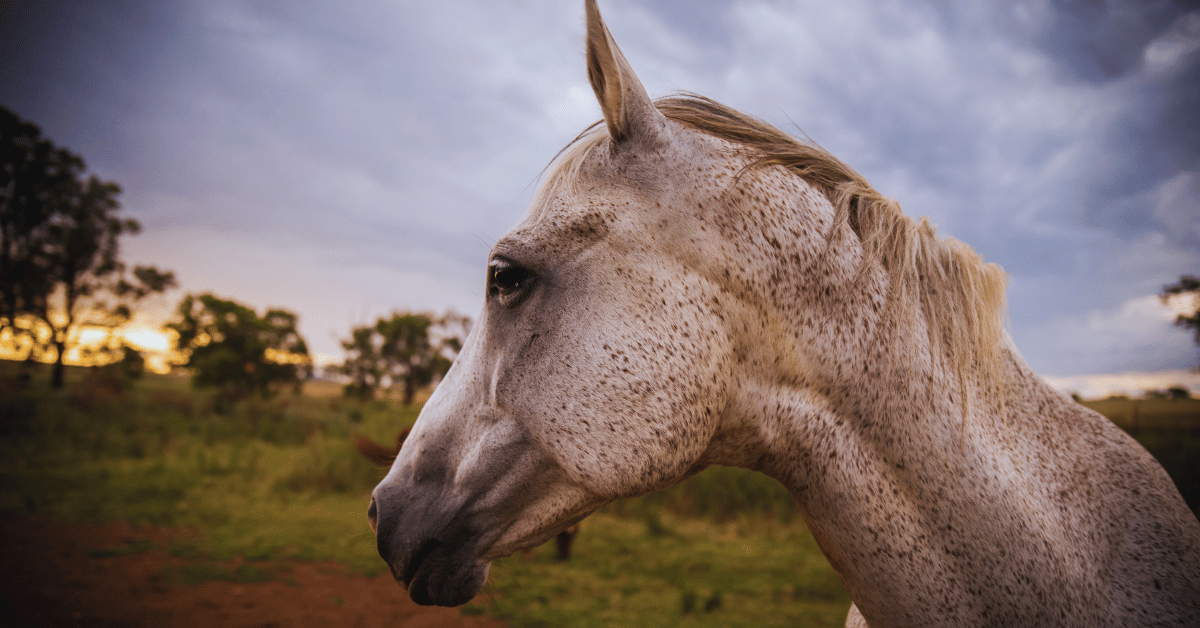You’ve probably dealt with fleas on pets like cats or dogs, but do horses get fleas? While it’s less common, horses can indeed become hosts for these pesky parasites. The problem isn’t just the discomfort caused by constant itching; fleas can also carry diseases and lead to secondary infections, turning a minor nuisance into a significant health concern.
Imagine your horse restless, scratching against fences, or losing patches of its glossy coat. These are more than just minor annoyances—they’re signs of a deeper issue that demands immediate attention. Left unchecked, a flea infestation can wreak havoc on your horse’s well-being, compromising its health and happiness.
Thankfully, with the right approach to pest control, you can protect your horse from these tiny invaders. From identifying early warning signs to implementing effective prevention strategies, this guide covers everything you need to ensure your equine companion stays flea-free and comfortable.
Understanding Horse Parasites

Fleas vs. Other External Parasites
Horses do not typically get fleas as commonly as dogs or cats. Fleas are primarily adapted to live on furry mammals, whereas horses have a different type of coat that does not provide an ideal environment for fleas (Quora). However, horses can still encounter fleas through contact with infested animals like wild rabbits, rodents, or even other horses.
Fleas are not the preferred hosts for horses and are generally temporary visitors. This means they are less likely to establish a long-term population on a horse’s body. Though less common, fleas are part of a broader category of external parasites that can affect horses, including:
- Ticks: These parasitic arachnids attach themselves to the horse’s skin and feed on blood, which can lead to infection and disease.
- Mites: Small, often microscopic, mites can cause mange, a skin condition characterized by itching, redness, and hair loss.
- Lice: These parasitic insects thrive in the horse’s coat, causing itching and irritation.
Different flea prevention medications are available for horses, including sprays, oral tablets, spot-on treatments, and flea collars. Consulting with a veterinarian can help determine the most suitable method based on the horse’s lifestyle.
Impact of Fleas on Horses
While fleas may not be a common problem for horses, they can still cause several issues when they do appear. One significant concern is that fleas can carry tapeworm eggs, leading to tapeworm infestations in horses.
Here are some potential impacts of fleas on horses:
- Irritation and Itching: Flea bites can cause significant itching and discomfort, leading to scratching and self-inflicted injuries.
- Allergic Reactions: Some horses may develop allergic reactions to flea saliva, resulting in dermatitis and more severe skin conditions.
- Secondary Infections: Constant scratching and biting in response to flea bites can break the skin and lead to bacterial infections.
It’s essential to monitor your horse for signs of flea infestation and consult a veterinarian for appropriate prevention and treatment measures. Additionally, check out our articles on do horses get ticks and can horse sweat for related information.
Flea Prevention in Horses

Preventing flea infestations in horses is essential for maintaining their health and comfort. Recognizing symptoms and implementing effective treatment and control measures can help keep your horses flea-free.
Flea Infestation Symptoms
It can be challenging to identify fleas on horses, but several symptoms may indicate an infestation. Pay attention to the following signs:
- Excessive Scratching: Horses may scratch, bite, or rub specific areas of their skin.
- Hair Loss: Bald patches or thinning hair are common signs.
- Red, Inflamed Skin: Look for irritated and swollen areas, especially along the mane, tail, and underbelly.
- Scabs and Sores: Continuous biting and scratching can lead to open sores and scabs.
- Anemia: Advanced age horses with severe infestations may develop anemia. Symptoms include rapid breathing, lack of appetite, and excessive sleeping.
| Symptom | Description |
|---|---|
| Excessive Scratching | Frequent scratching, biting, or rubbing specific areas of the skin |
| Hair Loss | Bald patches or thinning hair |
| Red, Inflamed Skin | Irritated and swollen areas, often along the mane, tail, and underbelly |
| Scabs and Sores | Open sores and scabs from continuous scratching and biting |
| Anemia | Rapid breathing, lack of appetite, and excessive sleeping in severe cases |
Treatment and Control Measures
Treating fleas in horses involves using specific products and maintaining a clean environment. Here are some effective measures:
- Topical Insecticides: Use insecticides formulated explicitly for equines. Consult a veterinarian to choose the appropriate product and ensure its safe application, as some formulations designed for other animals may be toxic to horses (Happie Animals).
- Regular Grooming: Groom your horse regularly to remove fleas and monitor their overall condition. Pay special attention to areas where fleas are likely to hide, such as the mane, tail, and underbelly.
- Clean Living Environment: Maintain a clean stable and pasture. Regularly remove manure, uneaten food, and debris which can harbor fleas. Sanitize bedding and other equipment.
- Flea Preventative Products: Use equine-specific flea preventative products to reduce the risk of infestation. Discuss with your vet to find out which products are safe and effective.
- Treat Other Animals: Treat dogs, cats, and other animals on the property for fleas. Fleas can transfer between species and re-infest horses.
Maintaining a flea-free environment involves continuous vigilance and proper care. Regularly monitoring and applying preventive strategies ensures your horse remains healthy and comfortable. For more information on other common parasites in horses and effective preventive strategies, explore our extensive guide on parasite management.
Additional resources:
Other Common Parasites in Horses
Aside from fleas, horses can be plagued by various internal parasites that affect their overall health and well-being. Understanding these parasites and their impact is crucial for effective management and control.
Types of Internal Parasites
Horses can be affected by several species of internal parasites. Here are some of the most common:
- Nematodes (Strongyles)
Large Strongyles: For example, Strongylus Vulgaris which can migrate through arteries causing severe issues.
Small Strongyles: Considered the most prevalent intestinal parasite in adult horses.
- Roundworms (Ascarids)
These worms are known for their migration from the gut to major organs like the heart, liver, and lungs and back to the gut.
- Tapeworms
These parasites attach themselves to the walls of the intestines, causing various gastrointestinal disturbances.
- Threadworms, Pinworms, and Botfly Larvae
Threadworms and Pinworms: Although of minor significance, they still pose health risks.
Botfly Larvae: Larvae of botflies can cause damage to the stomach lining (OSU Extension).
| Parasite Type | Example Species | Affected Areas | Health Impact |
|---|---|---|---|
| Nematodes (Strongyles) | Strongylus Vulgaris | Intestines, Arteries | Blood clots, colic, intestinal damage |
| Roundworms (Ascarids) | Parascaris equorum | Heart, liver, lungs, gut | Maturation in small intestine, liver damage |
| Tapeworms | Anoplocephala perfoliata | Intestinal walls | Intestinal blockages |
| Botfly Larvae | Gasterophilus intestinalis | Stomach lining | Stomach obstruction, lining damage |
Effects on Horse Health
Internal parasites can lead to numerous health issues in horses, impacting various bodily functions. Here are some detrimental effects:
Weight Loss and Poor Growth : Parasites can divert essential nutrients away from the horse, resulting in weight loss and stunted growth.
Coarse and Dull Coats : A significant parasite burden can manifest externally through poor coat quality.
Potbellies and Tail Scratching : Parasitic infestations can lead to distended abdomens and excessive tail-rubbing due to irritation.
Colic and Gastrointestinal Issues : Parasites like large strongyles can cause colic and severe gastrointestinal lesions and liver damage.
Respiratory Complications : Ascarids, during their migration, can cause respiratory issues as they pass through the lungs.
By staying vigilant about these common parasites and their effects, horse owners can take proactive steps to ensure the health and longevity of their companions. For more detailed information on how to effectively prevent and manage these parasites, explore our section on parasite management in horses.
Parasite Management in Horses
Ensuring the health and well-being of horses requires effective strategies for managing parasites. Proper management techniques can prevent infestations and keep your horse healthy.
Effective Preventive Strategies
Preventive measures are crucial in the fight against parasites. Here are some effective strategies:
Regular Deworming: Implement a deworming schedule tailored to your horse’s needs. This schedule should be based on fecal egg counts and the specific parasites prevalent in your area. It’s important to use different classes of dewormers to avoid resistance.
Pasture Management: Rotating pastures and avoiding overgrazing can reduce the parasite load in the environment. Cleaning up manure regularly, ideally every few days, can significantly decrease the presence of parasite eggs.
Feeding Practices: Use feeders that keep hay and grain off the ground to prevent contamination from feces. Provide clean water sources to avoid waterborne parasites.
Grooming and Cleaning: Regular grooming and cleaning the horse’s living area can help prevent external parasites like fleas and ticks. Although fleas do not commonly infest horses, it’s still essential to check for any signs of pests.
Flea Prevention Products: Utilize flea prevention methods such as sprays, spot-on treatments, and oral tablets when recommended by a veterinarian. These products help to keep parasites at bay and should be used as part of a comprehensive parasite control plan (Redtail Equine Veterinary Service).
Importance of Regular Monitoring
Regular monitoring is essential to ensure early detection and effective management of parasites.
Fecal Egg Counts (FECs): Conduct frequent FECs to determine the parasite burden and identify the specific parasites present. This information helps in tailoring the deworming program.
Physical Health Checks: Conduct regular health checks to identify any signs of parasitic infections such as weight loss, dull coat, and excessive scratching. Flea infestations, though rare, can cause anemia in severe cases.
Record Keeping: Maintain detailed records of deworming schedules, FEC results, and any treatments administered. This data helps in assessing the effectiveness of the parasite management program and making necessary adjustments.
Veterinary Consultation: Regular consultations with a veterinarian ensure that your parasite control program is up-to-date and effective. They can provide guidance on the most suitable preventive strategies based on the latest research and local parasite prevalence.
A comprehensive parasite management plan involves multiple strategies to keep parasite loads at a manageable level, ensuring the health and well-being of your horse. For detailed advice on feed practices and common horse-related questions, explore our articles on whether can horses eat bananas, can horses eat watermelon, and more.

